
@’s by Writer Larry Tye
Of SUPERMAN: THE HIGH FLYING HISTORY OF AMERICA’S MOST ENDURING HERO!
Below is an email conversation between the author (fresh off of his appearance at Wizard World in Chicago) and myself, in which he divulges his inspirations for writing the book, the incredible amount of research that goes into such a project, and which portrayal of the character is his definitive Superman.
THE DEAN: First of all, congratulations on the success of SUPERMAN! It’s a fantastic read and absolutely essential for any fan of the character, or just comics in general. Now, you recently spent a weekend in Chicago for Wizard World promoting your book and meeting with fans, so I have to ask– what did you think? This certainly wasn’t your first convention, since you were in Metropolis, IL for their Superman Celebration, and then in San Diego for the mother of all comic conventions, but did we do okay here in the Second City?
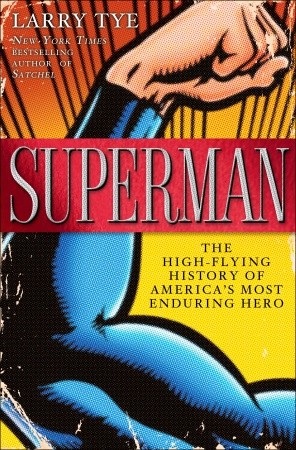 LARRY TYE (LT): Chicago was terrific. The audiences at my five talks ranged from 10 to 300. I loved the big one, at Wizard World, because it was a chance to talk to avid fans about things them might not have known about their favorite hero, and to hear what they wanted to know. I loved the mid-sized ones (25 and 100) at the two synagogues I addressed, because it let me tell Jews about a hero they should be proud of but didn't realize shared their ethnicity. And I liked the intimate settings of comic-book stores because it let me engage in a free-wheeling discussion with old-time comics readers.
LARRY TYE (LT): Chicago was terrific. The audiences at my five talks ranged from 10 to 300. I loved the big one, at Wizard World, because it was a chance to talk to avid fans about things them might not have known about their favorite hero, and to hear what they wanted to know. I loved the mid-sized ones (25 and 100) at the two synagogues I addressed, because it let me tell Jews about a hero they should be proud of but didn't realize shared their ethnicity. And I liked the intimate settings of comic-book stores because it let me engage in a free-wheeling discussion with old-time comics readers.DEAN: Since you’ve spent a lot of time immersed in comic book and popular culture recently at these conventions, what do you see as the current status of Superman? Is he still the king of superheroes among comic fans and the general public? Give us your “State of Superman” address, if you will.
LT:Superman is alive and well but, in the wake of the blockbuster Batman movie and the slightly less successful Spiderman one, it's time for a Superman movie that draws back old fans and introduces the Man of Steel to new ones. I wish it were happening this summer, as originally planned, but the anticipation is building for next summer's big release, which Warner Bros., Superman fans and I all hope will be as big as the Christopher Reeve series of movies of the 1970s and 80s.
That said, Superman still reigns supreme in several senses. His backstory and the hope he offers for today and tomorrow remain, in my mind at least, the most compelling superhero stories ever. Today's world, I think, has enough dark heroes like Batman and enough fraught ones like Spider-Man. What we need now -- much as we did when Superman sprung to life during the Great Depression -- is a hero of light, one who knows instinctively the difference between right and wrong and seldom wavers.
Clunky, perhaps. Familiar, certainly. But still reassuring, now more than ever.
DEAN: Your latest book is a pretty incredible achievement in that it’s borderline textbook material with the amount of knowledge you cram into it, but it’s also the most readable and enjoyable history of the Man of Steel that I’ve ever read. Superman’s past is so intertwined with comics, radio, television, and film that it’s nearly impossible to tell the history of one without any of the others, so what made you want to write this book, and how did it start out? Did you set out to create the most all-encompassing biography of Superman ever, or did you start with less ambitious intentions that just became impossible to contain?
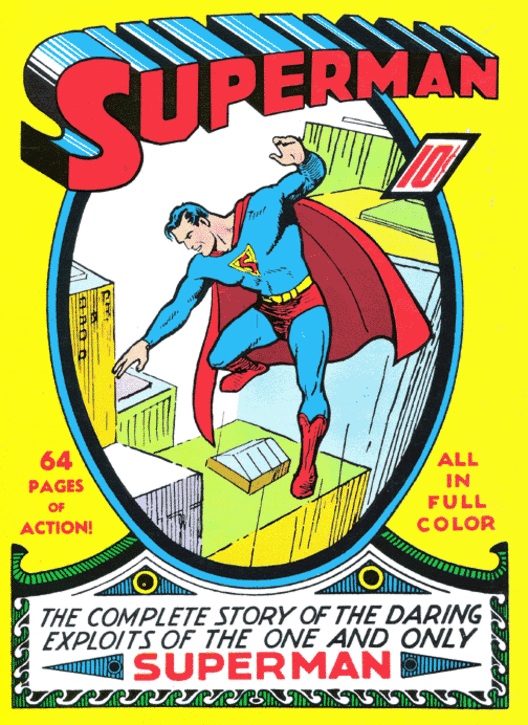 LT: I was intrigued by why America embraces the heroes we do, and decided the best way to understand that was to look at the longest-lasting hero of the last century, Superman, who tapped into the American psyche more effectively than anyone else. I thought he'd tell us something about us as well as him, and I think he did.
LT: I was intrigued by why America embraces the heroes we do, and decided the best way to understand that was to look at the longest-lasting hero of the last century, Superman, who tapped into the American psyche more effectively than anyone else. I thought he'd tell us something about us as well as him, and I think he did.My other goal was to feel like I was 10 again, which I did for the last two years of research and writing.
I hope, in the process, that I did a decent job of bringing to life Superman's history, which I think offers a brilliant lens into 75 years and counting of popular culture in America.
DEAN: One of the things I was most impressed by in your book was the amount of life you were able to breathe into not just Siegel and Schuster, but even Harry Donenfeld and Jack Liebowitz. Before reading your book these were merely important names to remember in case my Superman knowledge was ever challenged, but you give readers the chance to really get to know these guys more intimately. It has to be difficult to bring personality to these more “historical” figures who you can’t interview directly, so could you describe the research that went into fleshing them out?
LT: I did more than two hundred interviews, starting with historians, clerics, and psychologists who have written and lectured about Superman’s God-like attributes, his corrupting influences, and why children and their grandparents continue to embrace him. I spoke with writers and artists who brought Superman to life in comic books, comic strips, novels, and graphic novels, as well as on radio, TV, film, and animation. Ninety-two-year-old ghostwriter Alvin Schwartz told me how he wasn’t supposed to tell anyone that he was the man behind the newspaper strip, but then the New York Times outed him. Jack Adams, who was about to turn one hundred and was there at the beginning, talked about how, before they peddled comics, Superman’s publishers were peddling pornography. Jack Larson and Noel Neill explained why they initially did all they could to escape their Jimmy Olsen and Lois Lane personas from the wildly-popular TV ADVENTURES OF SUPERMAN, but now – like Superman’s other aging midwives – they relish the attention the connection still brings. Aaron Smolinski recounted the way kids teased him for appearing naked as baby Clark in SUPERMAN: THE MOVIE and the way people still ask, “‘How did you lift the truck?’ I say, ‘I’m Superman.’”
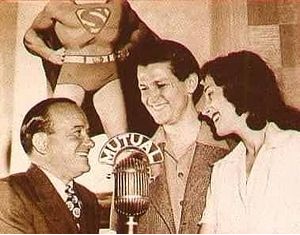 I visited Superman’s publisher in New York. I went to his movie studio in California and his hometown of Cleveland. I talked to fanatic fans and casual ones, adolescents and octogenarians, here and abroad. They all agreed with Donald Wurzelbacher of Cincinnati that Superman is “the godfather of superheroes . . . the original, first, and greatest.”
I visited Superman’s publisher in New York. I went to his movie studio in California and his hometown of Cleveland. I talked to fanatic fans and casual ones, adolescents and octogenarians, here and abroad. They all agreed with Donald Wurzelbacher of Cincinnati that Superman is “the godfather of superheroes . . . the original, first, and greatest.”I listened to hour after hour of Superman’s old radio broadcasts and watched his early and recent TV shows, cartoons, and films. I read everything I could find about him in newspapers, magazines, and books over more than seven decades. Columnists loved to quote Superman in the financial and editorial sections as well as in the comics, in tabloids like the New York Sun and high-minded broadsheets like the New York Times. I pored over thousands of pages of public records and ones never released from the ongoing lawsuit against Superman’s publisher by his creators’ heirs. I read the unpublished memoirs of Jerry Siegel and Jack Liebowitz, Superman’s creator and patron, and talked to their friends and relatives. I reviewed yellowing police records and coroner’s reports on George Reeves, the TV Man of Steel, with forensic experts and researchers who have spent a lifetime looking into his death. I began by worrying whether, given all that has been written on him, I would have anything new to say. I ended by worrying how to fit into a single manuscript all I have to say on this unambiguous hero who is as much a part of our communal DNA as Paul Bunyan or Huckleberry Finn.
DEAN: The Superman we know today has surprisingly little in common with the character Siegel and Schuster had originally conceived. Donenfeld and Liebowitz are of course a big part of his evolution since ACTION COMICS #1, but you can’t leave out the numerous contributions from guys like Bill Finger, Robert Maxwell, George Lowther; even the coloring errors of Leo Nowak are now essential elements of the character’s mythos. Who is it you think is most responsible for Superman as we know him now?
LT: That's a great question and a difficult one to answer.
The best I can do is to say EVERYBODY. That's the brilliance of a hero who has lasted nearly 75 years. He is a blend of everyone who has written and drawn him over time, with layer added upon layer, refinement upon refinement. The people who are doing that today are playing an instrumental role in giving us today's Superman, but they couldn't have done it without the hero Jerry and Joe, Harry and Jack, unveiled in the 1930s, and that the others you mentioned added on since then.
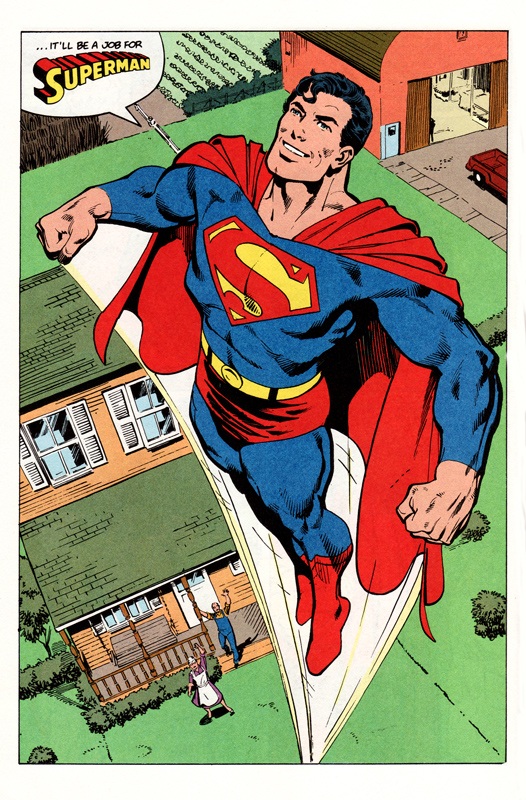 Fans also were essential. Their feedback over the decades -- whether it was letters to Mort Weisenger or emails to Geoff Johns -- offer a Rorschach Test of the pulse of the times they were writing and the aspirations of those fans. Superman's editors, writers and artists paid attention, and the hero they gave us was in no small part the hero we told them we needed in each era.
Fans also were essential. Their feedback over the decades -- whether it was letters to Mort Weisenger or emails to Geoff Johns -- offer a Rorschach Test of the pulse of the times they were writing and the aspirations of those fans. Superman's editors, writers and artists paid attention, and the hero they gave us was in no small part the hero we told them we needed in each era.DEAN: With all of the various overhauls that the character’s gone through over the past several decades, and across so many different outlets, there’s never really been a permanent answer to the questions of how to make Superman ‘cool’ again. He’s consistently a top seller, yet he seems to always have more, or at least louder critics than he does supporters. In your research for the book, what’s the most common reason you came across for why people don’t relate to, or have no interest in Superman over other superheroes?
LT: It's a function of being the first, the best, and the most righteous. That makes him an easy target, same as it always has. People always like to take a swing at the king of the mountain, in hopes of pushing him off and being remembered as the one who did. It's also easy to make fun of Dudley-do-Right, because doing good can seem boring and lacking in edge. The truth is that Superman keeps coming back, defying his critics, delighting writers and artists who help forever find new ways to make him interesting, relevant, and even vulnerable. My favorite touchstones on whether or not Superman is cool is how many kids hold him up as a model -- and all you need to do is walk down any street in America to see that more kids are wearing Superman's shirt than Spiderman's, Batman's, or any other hero's.
DEAN: An often cited reason for Superman being ‘lame’ that I’ve come across is his villains. I’m a big Mxyzptlk fan, but I’ll admit it takes a certain sense of humor, I guess, to appreciate him and a lot of the other regulars. What do you think is essential for a good Superman villain, and do you have a favorite?
LT: I love Lex, Brainiac, General Zod, and even Doomsday. I like kryptonite -- his most effective adversary -- in all its rainbow of colors. And while it's tough to compete with The Joker and Batman's other foes, I think we give short shrift to Superman's.
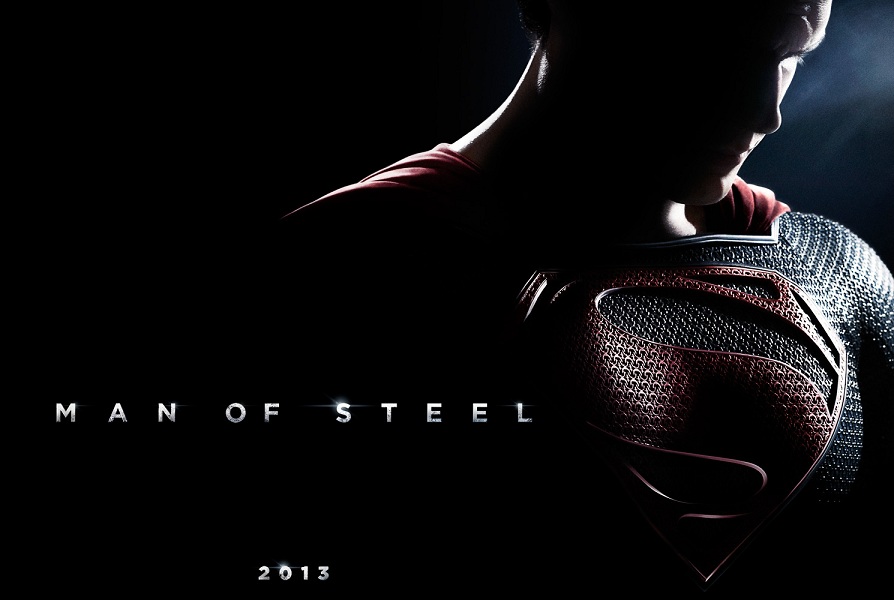 DEAN: It feels like Superman’s always good for a flourish of popularity here and there, but nothing since Byrne, and even that was relatively short-lived, has provided a consistent boost in sails enough to carry the character through multiple years. His death was able to bring the collectors and nostalgic fans in, creating one of DCs biggest years and pushing sales into the millions, but it seems struggling or dwindling Superman comic sales has been the mainstay for the majority of my life. What about the new stuff? Do you think the New 52 from DC has provided a sufficient and enduring Superman for the 21 century so far?
DEAN: It feels like Superman’s always good for a flourish of popularity here and there, but nothing since Byrne, and even that was relatively short-lived, has provided a consistent boost in sails enough to carry the character through multiple years. His death was able to bring the collectors and nostalgic fans in, creating one of DCs biggest years and pushing sales into the millions, but it seems struggling or dwindling Superman comic sales has been the mainstay for the majority of my life. What about the new stuff? Do you think the New 52 from DC has provided a sufficient and enduring Superman for the 21 century so far?LT: I am just back from Wizard World in Chicago, and did talks at two of that city's most popular comic book stores. Discussions with the owners and fans convinced me that what it'll talk to make Superman sell big again is the same thing that has given a recent boost to sales of Batman books: a blockbuster movie. Hopefully next summer's Man of Steel will deliver.
DEAN: So, to wrap up on a more personal note– my favorite Superman item from my childhood was the action figure from Kenner’s Super Powers line. I went through like 3 of them because they’d wear out, or I’d lose the cape, and my dog chewed up one of them. I still have the two my dog didn’t chew and they’re probably the most indispensable of all of my Superman stuff. If you could only hold on to one Superman memento, what would it be and why?
LT: It'd be a copy of the Boston Globe from June 17, 1959 -- the day headlines described George Reeves' suicide. It was the darkest of days for fans like me of George's TV ADVENTURES OF SUPERMAN, although ones as young as me knew Superman couldn't really kill himself even if he wanted to. But having that paper around now would remind me of what my first and favorite Superman stood for, in life and even in reading about his tragic death. He wasn't the best actor to play the Man of Steel, far from it, and the cheesy special effects back then look crude when I rewatch them today. George swallowed his words and didn't do anything other than change clothes and take off his glasses to make us believe his transformation from Clark to Supes.
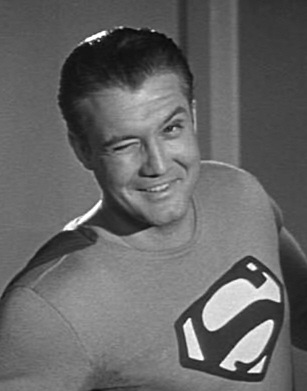 But whatever he did do worked. It worked because fans wanted to be fooled, and because of the way George turned to the camera and made it clear he knew that we knew his secret, even if Lois, Jimmy, and Perry didn’t. His Superman had a dignity and self-assurance that projected even better on an intimate TV screen than it had in the movies. George just had it somehow. He called himself Honest George, The People’s Friend – the same kind of homespun language Jerry and Joe used for their creation – and he suspended his own doubts the way he wanted viewers like me to. He looked not just like a guy who could make gangsters cringe, but who believed in the righteousness of his hero’s cause. His smile could melt an iceberg. His cold stare and puffed-out chest could bring a mob to its knees. Sure, his acting was workmanlike, but it won him generations of fans. Today, when fans like me call to mind our carefree youth, we think of his TV ADVENTURES OF SUPERMAN, and when we envision Superman himself, it is George Reeves we see.
But whatever he did do worked. It worked because fans wanted to be fooled, and because of the way George turned to the camera and made it clear he knew that we knew his secret, even if Lois, Jimmy, and Perry didn’t. His Superman had a dignity and self-assurance that projected even better on an intimate TV screen than it had in the movies. George just had it somehow. He called himself Honest George, The People’s Friend – the same kind of homespun language Jerry and Joe used for their creation – and he suspended his own doubts the way he wanted viewers like me to. He looked not just like a guy who could make gangsters cringe, but who believed in the righteousness of his hero’s cause. His smile could melt an iceberg. His cold stare and puffed-out chest could bring a mob to its knees. Sure, his acting was workmanlike, but it won him generations of fans. Today, when fans like me call to mind our carefree youth, we think of his TV ADVENTURES OF SUPERMAN, and when we envision Superman himself, it is George Reeves we see.DEAN: Thanks for your time, Larry! If you haven’t already, be sure to check out Superman: The High-Flying History of America's Most Enduring Hero, in stores now!
Proofs, co-edits & common sense provided by Sleazy G
